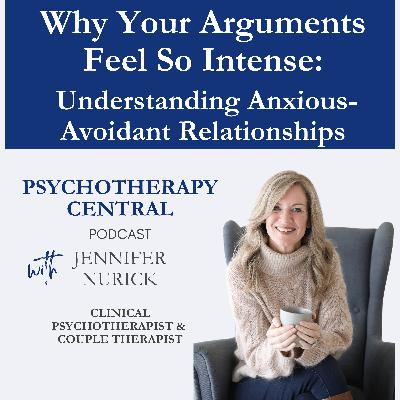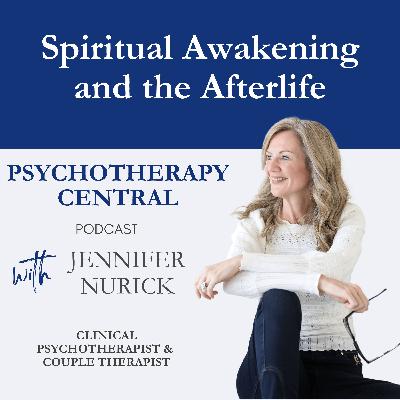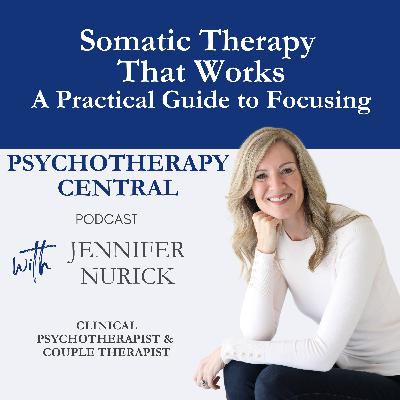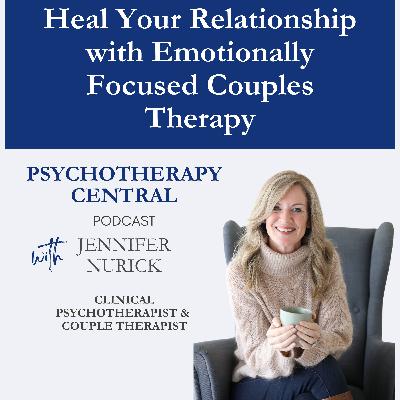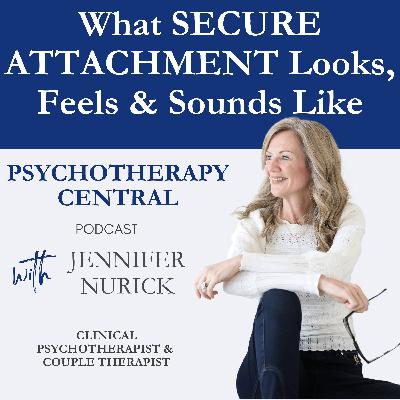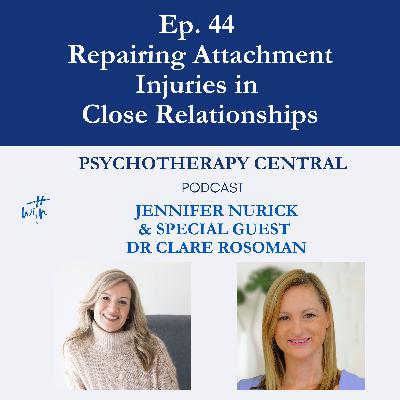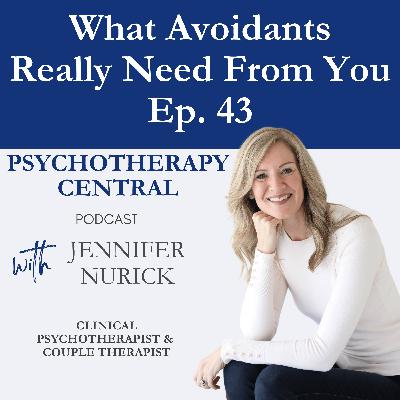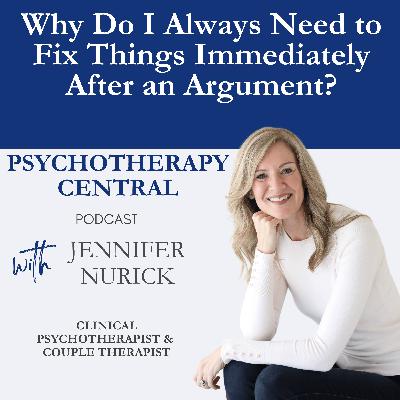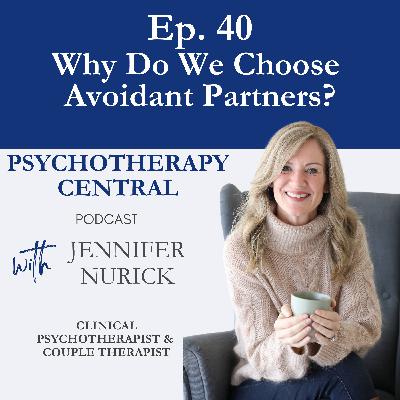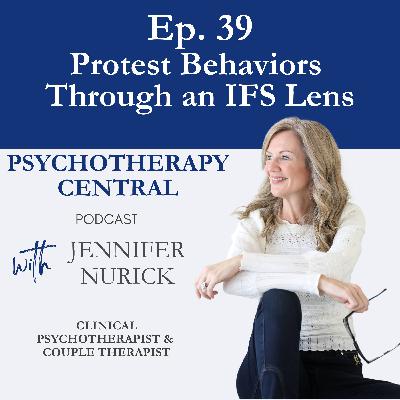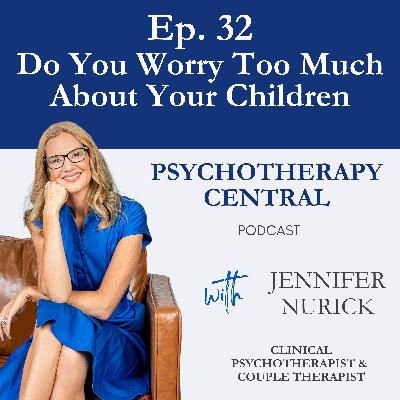Discover Psychotherapy Central
Psychotherapy Central

Psychotherapy Central
Author: Jennifer Nurick
Subscribed: 34Played: 448Subscribe
Share
© 2026 Jennifer Nurick, Psychotherapy Central Health, Data Bass Pty Ltd
Description
A place to learn about love, attachment and healing from trauma. Jen is a licensed psychotherapist, couple counsellor and energetic healer with over 18 years of experience working with love, attachment and trauma. Join me to discover, learn and grow together to heal and create intimate, thriving relationships.
45 Episodes
Reverse
In this episode, Jennifer Nurick is joined by co-facilitators Kristy Ismay and Irina Gladushchenko to explore the inspiration and intention behind Divine Radiance: The Path of Light Retreat — a profound spiritual journey to southern India, set in the radiant energy of the Sri Shakti Narayani Sri Puram Temple.
Together, they share their personal experiences of spiritual awakening in India, what makes this retreat so unique, and how stepping away from everyday life can help you reconnect to peace, devotion, and inner light.
This episode is an invitation to remember the power of sacred space, spiritual community, and the healing energy that emerges when you say “yes” to retreat.
What You’ll Learn
The deeper purpose and spiritual lineage behind Divine Radiance: The Path of Light Retreat
What makes this experience different from other retreats
Daily rhythms of the retreat and the energy of the Sri Puram Temple complex
How mantra, puja, and Vedic practices support energetic cleansing and alignment
The transformation that unfolds when you step into a sacred environment with intention
How retreat helps you reconnect with joy, purpose, and divine presence
Timestamps
00:00 – Welcome and story of how Divine Radiance began 05:12 – What first drew each facilitator to Amma and the Sri Puram Temple 10:38 – Personal stories of transformation and devotion in India 16:45 – Why this retreat was created and what makes it unique 22:04 – A day in the life at Divine Radiance: The Path of Light 27:33 – Supporting participants who are new to spiritual travel 33:21 – Transformation, healing, and creative renewal 38:40 – The community we co-create on retreat 42:18 – What to do if you feel called but nervous 46:00 – Each facilitator’s deepest hope for participants 49:00 – How to join the retreat
Facilitators
Jennifer Nurick Psychotherapist, energy healer, and Director of the International Energetic Healing Association (IEHA). Jennifer has led international retreats for over a decade and integrates Western psychotherapy, trauma healing, and ancient spiritual traditions to guide others on the path to wholeness and connection.
Kristy Ismay A heart-centred energy healer and Global Accreditations Manager for the IEHA. Kristy brings warmth, humour, and a nurturing presence to her work, blending professional teaching with intuitive healing and a deep love of community.
Irina Gladushchenko Leadership and Management Trainer, Co-Lead Teacher of the Energetic Health Faculty at Nature Care College, and Director of the IEHA. Irina combines grounded wisdom with spiritual insight to help others awaken their inner light.
Learn More & Join Us
If your heart feels called to this journey, we invite you to explore Divine Radiance: The Path of Light Retreat — an immersive experience of devotion, love, and spiritual awakening in India.
✨ Find out more and make a booking: https://sites.google.com/view/divine-serenity-retreats/home
Work With Jennifer:
Jennifer Nurick works with couples using Emotionally Focused Therapy (EFT) and Internal Family Systems (IFS) to foster secure attachment and healthier relationships. Sessions are available during Australian daytime hours, suitable for evening sessions in the U.S.
Book your session: psychotherapycentral.health
Connect With Psychotherapy Central:
Email: Join the Mailing List
Website: psychotherapycentral.health
Instagram: @psychotherapy.central
Facebook: Psychotherapy Central
YouTube: Psychotherapy Central
💬 Loved this episode? Please leave a review or share it with someone who needs to hear: You are more loved than you know.
Have a Question for Jen? DM your burning relationship or healing questions on Instagram — no question is too big or small!
If you enjoyed this episode, please leave a review or share it with someone who’s learning to listen to their body again.
Until next time — keep listening, keep healing.
With warmth,Jen 🌻
YOUTUBE | APPLE | SPOTIFY
Episode Overview: In this episode, Jen addresses a listener’s question about the anxious-avoidant dynamic in relationships, specifically regarding how disagreements tend to escalate quickly between them and their partner. Jen explores the underlying attachment styles at play, offering practical advice on how couples can break free from this exhausting cycle and communicate more effectively despite their nervous system reactions.
Key Takeaways:
The anxious-avoidant dynamic is a common issue in relationships and can be understood through attachment theory.
One partner may feel a need to get closer during conflict (anxious), while the other shuts down to cope (avoidant).
Understanding this dynamic is the first step towards healing. Creating pauses and giving each other space to regulate your nervous system can help break the cycle.
Jen outlines a few strategies to manage your nervous system in the heat of the moment, including grounding techniques and gentle movements to interrupt the freeze state.
Reframing the conflict by naming the cycle and seeing it as a shared experience can lead to more compassion and connection.
Jen’s Response: Jen dives into the listener’s experience, explaining how both anxious and avoidant attachment behaviors stem from a deep desire for safety and connection, albeit in different ways. She encourages listeners to pause in the middle of conflict, use a “safe word” to de-escalate, and regulate their nervous systems before continuing the conversation. She also suggests reflecting on the cycle together outside of the argument, creating space for both partners to recognize their emotional triggers and meet each other with understanding.
Actionable Steps for Breaking the Cycle:
Create Pauses During Conflict: Use a pre-agreed "safe word" (like "Abacus") to signal when a break is needed.
Care for Your Nervous System: Practice grounding exercises such as feeling your feet on the floor, using calming scents, or small intentional movements.
Reframe the Cycle: Discuss your patterns when you’re calm, acknowledging both partners' triggers and reactions.
Communicate from a Place of Safety: Share needs like reassurance or time to reflect on the argument in a compassionate way.
Resources Mentioned:
Free Relationship Cycle Worksheet: Track Negative Cycles Workbook – A downloadable resource to help couples map their communication patterns and break the cycle.
Jen's Weekly Class: Weekly Masterclass on love, attachment, and trauma healing – Join Jen live every Monday at 7:30 AM (Australia) or Sunday at 5:30 PM (Eastern Time, US) for in-depth discussions on healing attachment patterns.
Work With Jennifer:
Jennifer Nurick works with couples using Emotionally Focused Therapy (EFT) and Internal Family Systems (IFS) to foster secure attachment and healthier relationships. Sessions are available during Australian daytime hours, suitable for evening sessions in the U.S.
Book your session: psychotherapycentral.health
Connect With Psychotherapy Central:
Email: Join the Mailing List
Website: psychotherapycentral.health
Instagram: @psychotherapy.central
Facebook: Psychotherapy Central
YouTube: Psychotherapy Central
💬 Loved this episode? Please leave a review or share it with someone who needs to hear: You are more loved than you know.
Have a Question for Jen? DM your burning relationship or healing questions on Instagram — no question is too big or small!
If you enjoyed this episode, please leave a review or share it with someone who’s learning to listen to their body again.
Until next time — keep listening, keep healing.
With warmth, Jen 🌻
APPLE | SPOTIFY | YOUTUBE
In this deeply moving episode of Psychotherapy Central, I speak with Paul King and Craig McMahon about their personal experiences of spiritual awakening, connection with the afterlife, and how grief can open a path to purpose.
Paul shares the story of how a reading with a psychic medium changed his life, leading to the creation of Awaken—a spiritually-minded festival in Sydney bringing together energy healers, mediums, and seekers. Craig, a film producer known for Life to Afterlife, talks about his calling to create spiritually uplifting media after working in mainstream Hollywood.
Together, we explore:
The moment Paul knew there was life after death
How Craig’s loss led to connection with angels and spirit guides
Why synchronicity is a form of spiritual communication
How grief can open us to deeper spiritual awareness
What it means to awaken to your soul’s path
Whether you're navigating loss, exploring consciousness, or seeking a spiritual community—this episode offers warmth, insight, and hope.
🎟️ Sydney Listeners: Join us at the Awakin Festival, June 28–29 at the Hordern Pavilion in Sydney 💸 Use code PC50OFF for 50% off tickets. 🌐 Tickets https://events.humanitix.com/theafterlifeconvention-awakin-sydney-hordernpavilion?discountcode=PC50OFF
Work With Jennifer:
Jennifer Nurick works with couples using Emotionally Focused Therapy (EFT) and Internal Family Systems (IFS) to foster secure attachment and healthier relationships. Sessions are available during Australian daytime hours, suitable for evening sessions in the U.S.
Book your session: psychotherapycentral.health
Connect With Psychotherapy Central:
Website: psychotherapycentral.health
Instagram: @psychotherapy.central
Facebook: Psychotherapy Central
YouTube: Psychotherapy Central
💬 Loved this episode? Please leave a review or share it with someone who needs to hear: You are more loved than you know.
APPLE | SPOTIFY | YOUTUBE
In this episode of Psychotherapy Central, I take you inside one of the most powerful somatic tools I’ve ever encountered: Focusing, developed by philosopher and psychologist Eugene Gendlin.
If you’ve ever had a tightness in your chest, a lump in your throat, or a gut feeling that held more than words—you’ve already touched the edge of the felt sense. Focusing helps you go deeper.
Together, we’ll explore:
What the felt sense really is (and what it’s not)
The six simple steps of Focusing
Why Focusing is so effective in trauma healing
How to build a new, safe relationship with your body
Common questions people ask when starting this practice
Whether you’re a therapist or on your own healing journey, this episode gives you both insight and practice. I’ve also created a free guided audio to help you try Focusing for yourself (details below).
📥 Download the guided audio: www.psychotherapycentral.health/anxious-attachment
📘 Want to go deeper? Explore my book Heal Your Anxious Attachment for more on accessing and expressing the emotional truths inside.
💬 If this episode spoke to you, share it with someone you love or leave a review—it helps others find the show and begin their own healing journey.
With warmth, Jen 🌻
Work With Jennifer:
Jennifer Nurick works one on one and with couples using Somatic practices, Emotionally Focused Therapy (EFT) and Internal Family Systems (IFS) to foster secure attachment and healthier relationships. Sessions are available during Australian daytime hours, suitable for evening sessions in the U.S.
Book your session: psychotherapycentral.health
Connect With Psychotherapy Central:
Website: psychotherapycentral.health
Instagram: @psychotherapy.central
Facebook: Psychotherapy Central
YouTube: Psychotherapy Central
APPLE | SPOTIFY | YOUTUBE
In this episode of Psychotherapy Central, I’m diving into the deeply transformative process of Emotionally Focused Couple Therapy (EFCT)—one of the most effective, evidence-based approaches to relationship healing.
Whether you're feeling stuck in repetitive arguments, disconnected from your partner, or simply longing for deeper emotional intimacy, EFCT offers a roadmap. I’ll walk you through the three stages of this powerful therapy model and explore how we can move from disconnection and reactivity to vulnerability and reconnection.
You’ll learn:
What EFCT is and why it works
The pursue–withdraw cycle and how it keeps couples stuck
How to transform protest into vulnerability
The role of attachment needs in conflict
How EFCT supports long-term relational healing
If you’re a therapist, in a relationship, or simply curious about deep emotional healing, this episode is for you.
📖 Referenced in this episode: My book, Heal Your Anxious Attachment Past podcast episodes on Internal Family Systems (Episodes 5–11)
Work With Jennifer:
Jennifer Nurick works with couples using Emotionally Focused Therapy (EFT) and Internal Family Systems (IFS) to foster secure attachment and healthier relationships. Sessions are available during Australian daytime hours, suitable for evening sessions in the U.S.
Book your session: psychotherapycentral.health
Connect With Psychotherapy Central:
Website: psychotherapycentral.health
Instagram: @psychotherapy.central
Facebook: Psychotherapy Central
YouTube: Psychotherapy Central
💬 Loved this episode? Share it with a friend or leave a review—it helps us reach more people doing the work of healing.
Much love, Jen 🌻
YOUTUBE | SPOTIFY | APPLE PODCASTS
Episode 45: Secure Attachment – What It Looks, Feels, and Sounds Like (And Why It Matters)
In this foundational episode of Psychotherapy Central, Jennifer Nurick dives deep into secure attachment—unpacking what it truly means, how it feels, and why it's essential for healthy, resilient relationships. After examining anxious and avoidant attachment styles, Jennifer shares vivid, real-life examples and critical insights into secure attachment to help listeners understand and embody this relationship dynamic.
Key Highlights:
Why Secure Attachment Matters: Jennifer outlines compelling research showing secure attachment is linked with better emotional regulation, increased relationship satisfaction, higher emotional intelligence, effective conflict resolution, greater life satisfaction, and even improved physical health and stress resilience.
Real-Life Examples of Secure Attachment: Learn how secure attachment manifests in everyday interactions, such as comfortably giving and receiving love, open and honest communication, experiencing trust without excessive fear, effectively handling conflicts without threatening the relationship, and gracefully repairing after misunderstandings.
Building Secure Attachment: Jennifer provides practical guidance on how you can cultivate secure attachment, even if it wasn't modeled in your early life.
Referenced Research and Resources:
Jennifer Nurick: Heal Your Anxious Attachment
Mikulincer & Shaver (2007). Attachment in Adulthood: Structure, Dynamics, and Change
Pistole & Arricale (2003). Understanding attachment: Beliefs about conflict
Kafetsios (2004). Attachment and emotional intelligence
Malouff & Schutte (2016). Attachment and subjective well-being
Karreman & Vingerhoets (2012). Attachment and resilience
McWilliams & Bailey (2010). Attachment ratings and health conditions
Maunder & Hunter (2001). Attachment and psychosomatic medicine
Related Episodes:
EP 29 The Mindset of Secure Attachment
Ep. 44 – Repairing Attachment Injuries with Dr. Clare Rosoman
Ep. 2 – Avoidant Attachment Explained
Work With Jennifer:
Jennifer Nurick works with couples using Emotionally Focused Therapy (EFT) and Internal Family Systems (IFS) to foster secure attachment and healthier relationships. Sessions are available during Australian daytime hours, suitable for evening sessions in the U.S.
Book your session: psychotherapycentral.health
Connect With Psychotherapy Central:
Website: psychotherapycentral.health
Instagram: @psychotherapy.central
Facebook: Psychotherapy Central
YouTube: Psychotherapy Central
Hashtags: #SecureAttachment #RelationshipGoals #HealthyRelationships #AttachmentTheory #EmotionalIntelligence #ConflictResolution #RelationshipAdvice #EFTtherapy #IFStherapy #PsychotherapyCentral #CouplesCounseling #MentalHealthPodcast #Resilience #StressManagement #CommunicationSkills #TrustBuilding #RepairRelationships #SelfHealing
YOUTUBE | APPLE | SPOTIFY
In this insightful episode of Psychotherapy Central, host Jennifer Nurick interviews Dr. Clare Rosoman, clinical psychologist, international Emotionally Focused Therapy (EFT) trainer, and author of three powerful books on attachment and relationship healing. With over 25 years of clinical experience, Clare brings profound wisdom and practical insights into healing attachment injuries—those painful breaches of trust, betrayal, or abandonment in relationships.
In this conversation, Clare and Jennifer explore:
Clare’s personal and professional journey into Emotionally Focused Therapy.
Why vulnerability is the "magic juice" of relationship healing and attachment security.
The hidden personal benefits therapists experience when working deeply with EFT.
The wide-ranging impact of attachment injuries, beyond just infidelity.
How attachment injuries disrupt fundamental questions of emotional safety and trust.
The Attachment Injury Resolution Model—an evidence-based framework to repair relational ruptures.
Why creating safety and stability is essential before healing attachment wounds.
Key Resources Mentioned:
Clare's Books:
Repairing Attachment Injuries in Close Relationships: An Emotionally Focused Guide to Moving Beyond Betrayal
An Emotionally Focused Guide to Relationship Loss: Life After Love
An Emotionally Focused Workbook for Relationship Loss: Healing Heartbreak Session by Session
Dr. Sue Johnson’s foundational EFT book:
Hold Me Tight by Dr. Sue Johnson
Related Episodes:
Episode 43: What Avoidants Really Need (But Struggle to Ask For)
Episode 40: Why We Choose Avoidant Partners: An Internal Family Systems Perspective
Episode 2: Avoidant Attachment Explained
Connect with Dr. Clare Rosoman:
Dr. Clare Rosoman’s Website
Instagram: @clarerosoman
Connect with Jennifer Nurick and Psychotherapy Central:
Website: psychotherapycentral.health
Instagram: @psychotherapy.central
Facebook: Psychotherapy Central
YouTube: Psychotherapy Central
Explore more resources, insights, and support for secure and fulfilling relationships at Psychotherapy Central.
#AttachmentInjuries #EmotionallyFocusedTherapy #EFTtherapy #RelationshipHealing #AttachmentTheory #TrustRepair #CouplesTherapy #SecureAttachment #AttachmentHealing #TherapyInsights #DrClareRosoman #PsychotherapyCentral #HealYourRelationships #AttachmentTrauma #MentalHealthPodcast #EmotionalIntimacy #RelationshipAdvice #HealingFromBetrayal
APPLE | SPOTIFY
In this episode of Psychotherapy Central, host Jennifer Nurick delves into the often misunderstood world of avoidant attachment. While avoidantly attached individuals may appear self-sufficient and distant, they harbour deep emotional needs that they often find challenging to express.
In this episode Jennifer explores:
The internal experience of avoidant attachment
Core emotional needs of avoidant individuals, including:
Emotional safety without pressure
Acceptance for who they are
Connection on their terms
Freedom and autonomy within relationships
Reliability and consistency from partners
Non-verbal understanding
Validation of their feelings and boundaries
The reasons behind their difficulty in expressing these needs
Steps toward healing and fostering healthier relationships
Resources Mentioned:
Book: Heal Your Anxious Attachment by Jennifer Nurick. This holistic guide offers a trauma-informed approach to help individuals feel more secure, cultivate self-worth, and build healthier relationships.
Insight: Esther Perel emphasizes the importance of maintaining mystery and surprise in relationships to counteract routine and sustain desire.
Related Episodes:
Episode 2: Avoidant Attachment Explained – A comprehensive overview of avoidant attachment, its development, and its impact on relationships.
Episode 25: 9 Tips for Dating When You Are Avoidantly Attached – Practical advice for navigating the dating world with an avoidant attachment style.
Episode 31: Understanding Avoidant Attachment Behaviours – Delving deeper into the behaviors associated with avoidant attachment and strategies for change.
Episode 40: Why We Choose Avoidant Partners: An Internal Family Systems Perspective – Exploring the unconscious patterns that draw individuals to avoidant partners.
Connect with Jennifer Nurick:
Website: psychotherapycentral.health
Instagram: @psychotherapy.central
Facebook: Psychotherapy Central
YouTube: Psychotherapy Central
For further resources, insights, and support on your journey toward secure and fulfilling relationships, visit Psychotherapy Central.
APPLE | SPOTIFY
Do you feel an overwhelming urgency to fix things right after a disagreement? Does the silence feel unbearable, like something terrible will happen if you don’t resolve it right away?
In this episode of Psychotherapy Central, we explore the deep-rooted reasons behind this response, from nervous system activation to attachment wounds.
You'll discover: 🔥 Why your body treats arguments like life-or-death situations 🧠 How past experiences shape your response to conflict ❤️ The pursuer-withdrawer cycle in relationships 🌿 Six powerful strategies to calm your nervous system and break the cycle
This isn’t about fixing the argument—it’s about learning to regulate yourself so you can respond from a grounded, secure place.
Resources Mentioned:
📩 Have a question for Jen? – Email us at hello@psychotherapycentral.health
👶 Meet Your Inner Child Mini-Course – Learn to connect with and parent your younger parts: https://www.psychotherapycentral.health/meet-your-inner-child-registration
💌 Join My Mailing List – Get exclusive content and offers: https://www.psychotherapycentral.health/site/contact
For more content like this, follow Psychotherapy Central:
Website: psychotherapycentral.health
Instagram: @psychotherapycentral
Facebook: Psychotherapy Central
Youtube: @psychotherapycentral
Podcast: Psychotherapy Central Podcast
To get help on your journey through life, access our offerings:
One-on-One Therapy Sessions: Book a session here
Couple Counselling Sessions: Book a session here
Online Courses: Explore our courses here
Relationship Cycle Breaker: Register here
Free Training: Cycle Breaker's Circle
💖 If you found this episode helpful, please share it with someone who might need it. And don’t forget to leave a review—you might just win free access to one of my courses!
For more content on love, attachment, and healing, follow me on Instagram: @psychotherapy.central
See you next time! Warmly, Jen
APPLE | SPOTIFY
Do you find yourself repeatedly drawn to emotionally unavailable partners, even though you crave connection? In this episode of Psychotherapy Central, we explore why this pattern happens through the lens of Internal Family Systems (IFS), or parts work.
You'll discover:
💔 Why avoidant behavior is protective and how it forms🧠 How your own avoidant part might be choosing unavailable partners❤️ How childhood wounds and unprocessed relationship trauma influence partner choice🌿 The steps to break free from these patterns and cultivate secure attachment
IFS helps us understand the parts within us that unknowingly lead us toward distant partners. Healing begins with self-awareness, compassion, and working with these protective parts.
Resources Mentioned:
💌 Join My Mailing List – Be the first to know about new offers and resources:https://www.psychotherapycentral.health/site/contact
👶 Meet Your Inner Child Mini-Course – A self-paced course to connect with and nurture your inner child:https://www.psychotherapycentral.health/meet-your-inner-child-registration
📚 Heal Your Anxious Attachment – My signature course to develop secure attachment within yourself and in relationships:https://www.psychotherapycentral.health/heal-your-anxious-attachment
Episodes Referenced:
🎧 EP2: Avoidant Attachment Explained🎧 EP5: What is IFS Therapy? Internal Family Systems Therapy Explained
For more content like this, follow Psychotherapy Central:
Website: psychotherapycentral.health
Instagram: @psychotherapycentral
Facebook: Psychotherapy Central
Youtube: @psychotherapycentral
Podcast: Psychotherapy Central Podcast
To get help on your journey through life, access our offerings:
One-on-One Therapy Sessions: Book a session here
Couple Counselling Sessions: Book a session here
Online Courses: Explore our courses here
Relationship Cycle Breaker: Register here
Free Training: Cycle Breaker's Circle
💖 I hope you found this episode insightful. If you enjoyed it, please leave a rating or review. If you're watching on YouTube, don't forget to like and subscribe—it really helps!
👉 For more content on love, attachment, and healing, follow me on Instagram: @psychotherapy.central
See you next time!Warmly,Jen
#PsychotherapyCentral #IFS #AnxiousAttachment #RelationshipHealing #SelfAwareness #EmotionalHealing #AttachmentStyles #SelfCompassion #InnerWork #HealingJourney #MindfulRelationships #TherapyTools #BreakTheCycle #HealYourAnxiousAttachment #CycleBreakers #SelfHealers
YOUTUBE | APPLE | SPOTIFY
Have you ever found yourself texting your partner repeatedly, withdrawing to get their attention, or starting arguments over small issues? These are protest behaviors—your nervous system’s way of saying, I need to feel safe and connected.
In this episode, we dive deep into:
🔹 What protest behaviors are and why they happen
🔹 How childhood attachment wounds shape these reactions
🔹 The impact of protest behaviors on adult relationships
🔹 How Internal Family Systems (IFS) can help you heal these patterns
IFS teaches us that these behaviors stem from protective parts of us—exiles carrying deep fears of abandonment, and managers trying to keep us safe. Instead of criticizing yourself, you can learn to approach these parts with awareness, curiosity, and compassion.
💡 Want to go deeper?
📖 Heal Your Anxious Attachment—my book includes over 20 meditations and practical tools to support your healing. Available at all major book retailers.
🎧 IFS Deep Dive—Listen to episodes 5-13 of this podcast, especially episode 5, to understand IFS more deeply.
📲 More resources in the “ATTACHMENT” highlight on my Instagram.
If this episode resonated with you, please leave a 5-star review—it really helps!
🌿 Healing takes time, and every step you take matters. Love, Jen 💛
For more content like this, follow Psychotherapy Central:
Website: psychotherapycentral.health
Instagram: @psychotherapycentral
Facebook: Psychotherapy Central
Youtube: @psychotherapycentral
Podcast: Psychotherapy Central Podcast
To get help on your journey through life, access our offerings:
One-on-One Therapy Sessions: Book a session here
Couple Counselling Sessions: Book a session here
Online Courses: Explore our courses here
Relationship Cycle Breaker: Register here
Free Training: Cycle Breaker's Circle
#PsychotherapyCentral #IFS #AnxiousAttachment #RelationshipHealing #SelfAwareness #EmotionalHealing #AttachmentStyles #SelfCompassion #InnerWork #HealingJourney #MindfulRelationships #TherapyTools #BreakTheCycle #HealYourAnxiousAttachment #CycleBreakers #SelfHealers
APPLE | SPOTIFY
In this insightful episode of Psychotherapy Central, Jennifer Nurick welcomes Sue McDonnell, a seasoned psychotherapist and executive coach, to explore the profound connections between leadership and self-awareness. Sue shares her extensive experience working with executive teams and senior leaders, highlighting how conscious leadership can transform organizational dynamics and foster meaningful change.
Throughout the conversation, Sue delves into the concept of the leadership shadow, emphasizing the significant impact leaders have through their thoughts, words, and actions. She distinguishes between executive coaching and traditional psychotherapy, explaining how coaching focuses on outcome-driven goals and incorporates feedback from multiple stakeholders to enhance accountability and growth.
Listeners will gain valuable insights into Sue’s intuitive approach to coaching, which blends various therapeutic tools to meet the unique needs of each client. The episode also touches on the importance of vulnerability and authentic connection in leadership, the challenges of balancing personal and professional growth, and strategies for overcoming loneliness in today’s fast-paced world.
Sue and Jennifer discuss the lasting effects of COVID-19 on interpersonal relationships and the critical need for community and co-regulation to combat isolation. They explore practical tips for offering and receiving compassionate feedback, managing internal and external self-awareness, and cultivating a supportive environment both personally and professionally.
Whether you’re a leader seeking to enhance your self-awareness or someone interested in the intersection of psychotherapy and executive coaching, this episode offers profound wisdom and actionable strategies to foster transformation and build stronger, more empathetic relationships.
Key Takeaways:
The impact of leadership behavior on team dynamics and organizational culture.
Differences and complementary aspects of executive coaching versus psychotherapy.
The importance of clear, kind, and compassionate feedback in personal and professional growth.
Strategies for overcoming loneliness and building meaningful community connections.
Balancing continuous personal development with professional responsibilities.
Tune in to gain a deeper understanding of how conscious leadership and self-awareness can drive meaningful change within yourself and your organization.
References:
Books:
Lost Connections by Johann Hari: This book discusses the broader social and cultural factors contributing to depression, offering a perspective beyond the traditional medical model.
Works by Esther Perel: Mentioned in the context of relationships and transitions within marriages, particularly her insights on long-term partnerships and evolving dynamics.
The Art of Gathering by Priya Parker: valuable resource on the importance of community and creating meaningful gatherings
Websites and Concepts:
https://www.linkedin.com/in/sue-mcdonnell-91b5983/ - For more information on Sue's work with executive teams and leaders.
Thomas Hübl: Referenced for his expression “I’m feeling you feeling me,” highlighting the importance of attunement and connection in therapeutic work.
For more content like this, follow Psychotherapy Central:
Website: psychotherapycentral.health
Instagram: @psychotherapycentral
Facebook: Psychotherapy Central
Youtube: @psychotherapycentral
Podcast: Psychotherapy Central Podcast
To get help on your journey through life, access our offerings:
One-on-One Therapy Sessions: Book a session here
Couple Counselling Sessions: Book a session here
Online Courses: Explore our courses here
Relationship Cycle Breaker: Register here
Free Training: Cycle Breaker's Circle
Thank you for listening! If you enjoyed this episode, please leave a review and share it with your friends and family.
YOUTUBE | APPLE | SPOTIFY
Join host Jennifer Nurick, a clinical psychotherapist, as she delves into the topic of dissociation from the perspective of Internal Family Systems (IFS) therapy. This episode of Psychotherapy Central offers a deep dive into how dissociation can be understood and approached using the IFS model, providing valuable insights for therapists, clients, and anyone interested in the dynamics of psychological healing.
In this episode we cover the following:
Understanding Dissociation: Gain a foundational understanding of dissociation, including its symptoms and triggers, and why it occurs as a psychological defense mechanism.
Introduction to IFS: Learn about the Internal Family Systems therapy model, its core concepts, and how it differentiates between various parts within an individual.
Dissociation in IFS: Explore how dissociation is viewed within the IFS framework, focusing on the roles of protective parts and exiled parts in the dissociative process.
Healing Strategies: Discover the steps involved in healing dissociation using IFS, including building trust within the internal system, negotiating with protective parts, and helping exiled parts to unburden.
Practical Example: A case study illustrating the application of IFS in treating dissociative episodes, showing the therapeutic journey and the gradual integration of parts.
Featured Concepts:
The Self: The core of IFS therapy, representing the compassionate, curious, calm, and connected leader within. You can hear more about the ‘Self’ in IFS in Ep 7 - The Central Role of the “Self’ in IFS Therapy.
Managers and Firefighters: Protective parts in IFS that manage everyday functioning and respond to immediate threats, respectively. Ep. 8 Exiles, Managers and Firefighters in IFS Therapy.
Exiles: Parts that carry traumatic memories or intense emotions, often leading to dissociation when activated. Ep. 8 Exiles, Managers and Firefighters in IFS Therapy.
This episode is particularly beneficial for those working in mental health, those experiencing dissociative symptoms, and anyone looking to understand more about innovative approaches to psychotherapy.
Additional Resources:
Ep 5 - What is IFS Therapy?
Ep 6 - Six things you Need to Know About ‘Parts’ from an IFS Perspective
Ep 10 - Healing Trauma with Internal Family Systems Therapy (IFS)
One-on-one Therapy Sessions with Jen or her Team:
https://www.psychotherapycentral.health/bookings
Meet Your Inner Child Course:
https://www.psychotherapycentral.health/meet-your-inner-child-registration
FREE TRAINING:
I'll take you through the three stages of transformation: Discovery, Healing and Growth. We will explore Attachment Styles, and I'll share with you three things you can do to help you have more effective conflicts that don't deteriorate into relationship killers:
https://www.psychotherapycentral.health/cycle-breaker-registration
Also, join Jen in her exclusive online program to help you heal from an insecure attachment style and break repeating patterns in your relationships:
https://www.psychotherapycentral.health/rcb-registration
Browse Jen’s suite of online courses:
https://www.psychotherapycentral.health/store
Connect on socials:
Instagram: https://www.instagram.com/psychotherapy.central
Facebook: https://facebook.com/psychotherapy.central
Youtube: https://www.youtube.com/@psychotherapycentral
Pinterest: https://www.pinterest.com.au/psychotherapycentral
LinkedIn: https://www.linkedin.com/in/jennifer-nurick-psychotherapist
YOUTUBE | APPLE | SPOTIFY
In this insightful episode of Psychotherapy Central, host Jennifer Nurick dives deep into the often misunderstood phenomenon of dissociation. This episode is particularly useful for professionals in the mental health field, individuals experiencing dissociation, and anyone interested in psychological phenomena.
What You Will Learn:
Definition and Mechanics of Dissociation
Triggers and Causes of Dissociation
Symptoms of Dissociation
First Steps Towards Help
For Our Listeners: If you recognize signs of dissociation in yourself or others, reaching out for professional help is recommended. Understanding dissociation deeply can be the first step toward healing and developing healthier coping mechanisms.
Follow Psychotherapy Central:
Website: psychotherapycentral.health
Instagram: @psychotherapycentral
Facebook: Psychotherapy Central
Youtube: @psychotherapycentral
Podcast: Psychotherapy Central Podcast
Offerings:
One-on-One Therapy Sessions: Book a session here
Couple Counselling Sessions: Book a session here
Online Courses: Explore our courses here
Relationship Cycle Breaker: Register here
Free Training: Cycle Breaker's Circle
Thank you for listening! If you enjoyed this episode, please leave a review and share it with your friends and family.
YOUTUBE | APPLE PODCASTS
In this enlightening episode of the Psychotherapy Central Podcast, host Jennifer Nurick welcomes Dr. Amanda Ferguson, a registered psychologist and clinical hypnotherapist with over 32 years of experience. They delve into the pursuer-withdrawer pattern in relationships, a dynamic that can significantly impact relationship satisfaction and longevity. Dr. Ferguson shares her journey into psychology and hypnotherapy, offering deep insights into how these modalities can aid in self-discovery and healing. The discussion covers practical strategies for recognizing and addressing the pursuer-withdrawer pattern, the importance of active listening, and the value of seeking help early in a relationship. Jennifer and Amanda also explore how respecting and nurturing the foundational elements of respect and friendship can strengthen intimate relationships.
Referenced Books and Websites:
Life Works: Rediscover Yourself and Transform Your Relationships by Dr. Amanda Ferguson
The Seven Principles for Making Marriage Work by John Gottman
Mom’s House, Dad’s House by Isolina Ricci
Dr. Amanda Ferguson's website
Psych for Life podcast with Dr. Amanda Ferguson
Follow Psychotherapy Central:
Website: psychotherapycentral.health
Instagram: @psychotherapycentral
Facebook: Psychotherapy Central
Youtube: @psychotherapycentral
Podcast: Psychotherapy Central Podcast
Offerings:
One-on-One Therapy Sessions: Book a session here
Couple Counselling Sessions: Book a session here
Online Courses: Explore our courses here
Relationship Cycle Breaker: Register here
Free Training: Cycle Breaker's Circle
Thank you for listening! If you enjoyed this episode, please leave a review and share it with your friends and family.
YOUTUBE | APPLE PODCASTS | SPOTIFY
Welcome back to Psychotherapy Central, the podcast where we explore the depths of the human psyche and provide practical insights for your mental and emotional well-being. I'm your host, Jennifer Nurick, a psychotherapist dedicated to helping you navigate life's challenges.
In today's episode, I am thrilled to be joined by Cory Allen, a renowned personal development writer, podcast host, and influencer from Austin, Texas. Cory has just released his latest book, "Brave New You," a transformative guide that encourages readers to embrace change and live authentically. With a massive Instagram following reaching over a million people weekly and features in The New York Times, Cory brings a wealth of knowledge and experience to our conversation.
In This Episode, We Discuss:
Cory's journey into meditation and spiritual practice, sparked by a challenging upbringing and a quest for relief from emotional turmoil.
The evolution of Cory's self-awareness and consciousness through various experimental practices, including breathwork, psychedelics, and deep dives into Western and Eastern philosophies.
Practical strategies for embracing change and overcoming fear, highlighted by the key themes in Cory's new book, "Brave New You."
The importance of self-awareness in personal growth and how to develop resilience in the face of life's challenges.
The intersection of Eastern and Western approaches to mental health and how integrating both can lead to profound personal transformation.
Cory's unique insights on self-confidence, the power of mental narratives, and how to foster a deeper connection with oneself.
Resources Mentioned:
Cory Allen's book, Brave New You
Cory Allen on Instagram: @heycoryallen
Cory Allen's Substack: coryallen.substack.com
Cory's website: cory-allen.com
Book details: bravenewyoubook.com
Connect with Me:
Book a psychotherapy session: Psychotherapy Central Bookings
Explore my online courses: Psychotherapy Central Store
Instagram: https://www.instagram.com/psychotherapy.central
Facebook: https://facebook.com/psychotherapy.central
Youtube: https://www.youtube.com/@psychotherapycentral
Pinterest: https://www.pinterest.com.au/psychotherapycentral
LinkedIn: https://www.linkedin.com/in/jennifer-nurick-psychotherapist
Stay Connected:
Don't forget to subscribe to Psychotherapy Central on your favorite podcast platform and follow us on social media for updates, tips, and more!
YOUTUBE | APPLE | SPOTIFY
In this episode of Psychotherapy Central your host, Jennifer Nurick, dives deep into a topic that resonates with every parent: worrying about our children. We all experience it, but when does normal concern cross the line into excessive worry? Jen explores this important question, providing insights and practical strategies to help you manage your worries.
Highlights:
In this episode of Psychotherapy Central, host Jennifer Nurick delves into the topic of worrying about our children, a concern familiar to every parent. Jen explains the nature of worry, emphasizing that it is a natural part of parenting, but also explores how Western culture often sends mixed messages about parental worry, suggesting that excessive concern can indicate unhealthy attachment. She helps listeners identify the signs of excessive worry and offers practical strategies for managing it.
The episode also provides you with a free Cognitive Behavioral Therapy (CBT) worksheet designed to help parents effectively work through their worries. Tune in to gain valuable insights and tools to prevent worry from becoming overwhelming. Also, remember to check out the free CBT worksheet linked below.
Connect with Us:
If you have any questions or topics you’d like us to cover in future episodes, please reach out to us on social media or through our website. Remember, you’re not alone in your worries. We’re all in this together.
Resources:
Cognitive Behavioural Therapy (CBT) Worksheet: 5 Steps to Help Managing Parental Worry
https://www.psychotherapycentral.health/5-Steps-to-Help-Manage-Parental-Worry
Extra Resources:
One-on-one Therapy Sessions with Jen or her Team:
https://www.psychotherapycentral.health/bookings
Meet Your Inner Child Course:
https://www.psychotherapycentral.health/meet-your-inner-child-registration
FREE TRAINING:
I'll take you through the three stages of transformation: Discovery, Healing and Growth. We will explore Attachment Styles, and I'll share with you three things you can do to help you have more effective conflicts that don't deteriorate into relationship killers:
https://www.psychotherapycentral.health/cycle-breaker-registration
Also, join Jen in her exclusive online program to help you heal from an insecure attachment style and break repeating patterns in your relationships:
https://www.psychotherapycentral.health/rcb-registration
Browse Jen’s suite of online courses:
https://www.psychotherapycentral.health/store
Connect on socials:
• Instagram: https://www.instagram.com/psychotherapy.central
• Facebook: https://facebook.com/psychotherapy.central
• Youtube: https://www.youtube.com/@psychotherapycentral
• Pinterest: https://www.pinterest.com.au/psychotherapycentral
• LinkedIn: https://www.linkedin.com/in/jennifer-nurick-psychotherapist
YOUTUBE | APPLE | SPOTIFY
When you possess an avoidant attachment style, you might find that your voice grows louder in moments of distress, and you may become critical or demanding. This tendency can often lead you to focus predominantly on the negatives within your relationship, making it difficult to recognize positive aspects unless the relationship ends. Interestingly, these behaviors are often subconscious strategies aimed at creating a sense of safety, yet they can inadvertently distance you from your partner. This may leave you questioning why you react so and wondering if something is fundamentally wrong with you. It's important to understand that there is nothing wrong with you. Your behaviors are adaptations from your childhood experiences, which can be addressed and healed. If you ever feel perplexed by your actions and reactions, I encourage you to listen to this episode. Enjoy! Jen
Resources:
To learn more about the basics of attachment theory, listen to Episode 1.
EP1 - Five Things You Need to Know About Attachment Theory https://www.psychotherapycentral.health/podcasts/psychotherapy-central/episodes/2148037195
To learn more about the basics of avoidant attachment, listen to Episode 2.
EP 2 - Avoidant Attachment Explained
https://www.psychotherapycentral.health/podcasts/psychotherapy-central/episodes/2148041419
Extra Resources
Attachment theory by John Bowlby, Mary Ainsworth & Main & Solomon
One-on-one Therapy Sessions with Jen or her Team:
https://www.psychotherapycentral.health/bookings
Meet Your Inner Child Course:
https://www.psychotherapycentral.health/meet-your-inner-child-registration
FREE TRAINING:
I'll take you through the three stages of transformation: Discovery, Healing and Growth. We will explore Attachment Styles, and I'll share with you three things you can do to help you have more effective conflicts that don't deteriorate into relationship killers:
https://www.psychotherapycentral.health/cycle-breaker-registration
Also, join Jen in her exclusive online program to help you heal from an insecure attachment style and break repeating patterns in your relationships:
https://www.psychotherapycentral.health/rcb-registration
Browse Jen’s suite of online courses:
https://www.psychotherapycentral.health/store
Connect on socials:
• Instagram: https://www.instagram.com/psychotherapy.central
• Facebook: https://facebook.com/psychotherapy.central
• Youtube: https://www.youtube.com/@psychotherapycentral
• Pinterest: https://www.pinterest.com.au/psychotherapycentral
• LinkedIn: https://www.linkedin.com/in/jennifer-nurick-psychotherapist
YOUTUBE | APPLE | SPOTIFY
When you possess an anxious attachment style, you might find that your voice grows louder in moments of distress, and you may become critical or demanding. This tendency can often lead you to focus predominantly on the negatives within your relationship, making it difficult to recognize positive aspects unless the relationship ends. Interestingly, these behaviors are often subconscious strategies aimed at creating a sense of safety, yet they can inadvertently distance you from your partner. This may leave you questioning why you react so and wondering if something is fundamentally wrong with you. It's important to understand that there is nothing wrong with you. Your behaviors are adaptations from your childhood experiences, which can be addressed and healed. If you ever feel perplexed by your actions and reactions, I encourage you to listen to this episode.
Resources:
To learn more about the basics of anxious attachment, listen to Episode 3.
EP 3 Anxious Attachment Explained
https://podcasts.apple.com/au/podcast/psychotherapy-central/id1701257974?i=1000623929027
Extra Resources
Attachment theory by John Bowlby, Mary Ainsworth & Main & Solomon
One-on-one Therapy Sessions with Jen or her Team:
https://www.psychotherapycentral.health/bookings
Meet Your Inner Child Course:
https://www.psychotherapycentral.health/meet-your-inner-child-registration
FREE TRAINING:
I'll take you through the three stages of transformation: Discovery, Healing and Growth. We will explore Attachment Styles, and I'll share with you three things you can do to help you have more effective conflicts that don't deteriorate into relationship killers:
https://www.psychotherapycentral.health/cycle-breaker-registration
Also, join Jen in her exclusive online program to help you heal from an insecure attachment style and break repeating patterns in your relationships:
https://www.psychotherapycentral.health/rcb-registration
Browse Jen’s suite of online courses:
https://www.psychotherapycentral.health/store
Connect on socials:
• Instagram: https://www.instagram.com/psychotherapy.central
• Facebook: https://facebook.com/psychotherapy.central
• Youtube: https://www.youtube.com/@psychotherapycentral
• Pinterest: https://www.pinterest.com.au/psychotherapycentral
• LinkedIn: https://www.linkedin.com/in/jennifer-nurick-psychotherapist
YOUTUBE | APPLE PODCASTS | SPOTIFY
Discover the transformative power of secure attachment in our latest podcast episode, "The Mindset of Secure Attachment." Hosted by Jennifer Nurick, a seasoned psychotherapist. This episode delves into how developing a secure attachment can significantly enhance your relationships and self-awareness.
This episode explores five key aspects of secure attachment. Jennifer provides in-depth analysis and practical advice on cultivating these traits in your life, explaining how they lead to more stable, reliable connections and a healthier, more positive self-image.
Listeners will learn how secure attachment allows for self-reliance and meaningful closeness with others, helps manage and express emotions constructively, and encourages a reflective mindset that embraces growth and learning from mistakes.
This episode is not only insightful but also offers practical benefits that can improve your interpersonal relationships and personal development. Whether you want to deepen your connections or enhance your emotional intelligence, "The Mindset of Secure Attachment" provides valuable guidance and support.
Tune in to build more satisfying and resilient relationships and enhance your journey towards personal fulfilment. Connect with Jennifer on Instagram for personalised advice and insights. Let's grow together in understanding and implementing the principles of secure attachment.
Enjoy the show!
Resources:
To learn more about the basics of attachment, listen to my earlier episodes:
Ep 1: 5 Things You Need to Know About Attachment Theory
https://podcasts.apple.com/au/podcast/psychotherapy-central/id1701257974?i=1000623522185
EP 2 Avoidant Attachment Explained
https://podcasts.apple.com/au/podcast/psychotherapy-central/id1701257974?i=1000623584769
EP 3 Anxious Attachment Explained
https://podcasts.apple.com/au/podcast/psychotherapy-central/id1701257974?i=1000623929027
EP 4 Disorganized Attachment Explained
https://podcasts.apple.com/au/podcast/psychotherapy-central/id1701257974?i=1000624299907
Extra Resources
Attachment theory by John Bowlby, Mary Ainsworth & Main & Solomon
FREE TRAINING:
I'll take you through the three stages of transformation: Discovery, Healing and Growth. We will explore Attachment Styles, and I'll share with you three things you can do to help you have more effective conflicts that don't deteriorate into relationship killers:
https://www.psychotherapycentral.health/cycle-breaker-registration
Also, join Jen in her exclusive online program to help you heal from an insecure attachment style and break repeating patterns in your relationships:
https://www.psychotherapycentral.health/rcb-registration
Browse Jen’s suite of online courses:
https://www.psychotherapycentral.health/store
Connect on socials:
• Instagram: https://www.instagram.com/psychotherapy.central
• Facebook: https://facebook.com/psychotherapy.central
• Youtube: https://www.youtube.com/@psychotherapycentral
• Pinterest: https://www.pinterest.com.au/psychotherapycentral
• LinkedIn: https://www.linkedin.com/in/jennifer-nurick-psychotherapist



